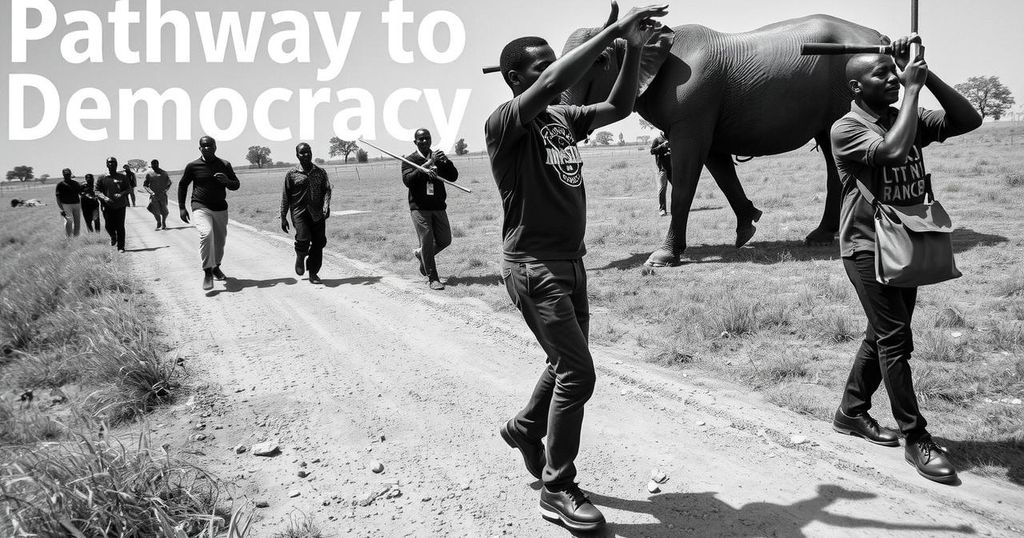South Sudan postponed elections until December 2026 due to inadequate preparations, prompting concerns about its transition to democracy. The country faces deep-rooted structural issues exacerbated by ethnic favoritism and centralized power, while the international community’s aid-focused view fails to recognize its potential. True change requires a national dialogue to address these issues and redefine governance based on citizenship rather than ethnicity, culminating in a new constitution and democratic principles.
On September 18, 2024, the transitional government of South Sudan delayed its elections until December 2026, primarily due to deficiencies in the legislative, financial, and technical frameworks necessary for credible electoral processes. This postponement raises fundamental concerns regarding South Sudan’s capability to transition to a democratic regime, prompting inquiries on the requisite measures for actualizing this transition.
The challenges faced by South Sudan can be traced back to its emergence as an independent nation in 2011, where deep-rooted structural issues persisted. The independence lacked a robust framework to establish institutions that could foster a functional state. The successive post-independence administration has disproportionately favored specific ethnic groups, while the transitional constitution has concentrated power within the presidency and the central government in Juba. This centralization has marginalized ordinary citizens and limited their participation, thereby failing to cultivate an environment conducive to political opposition. Consequently, ethnic and regional tensions have continued to escalate.
While the populace bears a substantial burden of responsibility for the nation’s tribulations, the international community’s approach has often exacerbated the crisis by framing South Sudan as solely a humanitarian plight requiring aid, elections, and conflict resolution. Such a perspective neglects the potential for economic growth and development within the country. Since the onset of civil conflict in 2013, peace agreements signed in 2015 and 2018, although backed by international support, have not addressed the core structural issues. Instead, these agreements have effectively solidified the interests of unelected leaders while leaving citizens without meaningful democratic institutions.
There is a pressing need for South Sudan to abandon short-term, piecemeal solutions, such as elections, which will not resolve the entrenched structural issues. The current political landscape has been shaped by a legacy of authoritarian governance rooted in historical oppression and colonialism. Therefore, South Sudan requires not only a change in political leadership but also a renewed commitment to independence that prioritizes the cultivation of political, economic, and security institutions. This transformation necessitates a focus on managing the country’s ethnic diversity.
To navigate these complex challenges, South Sudanese must engage in a sincere dialogue regarding the nation’s failures. It is crucial to foster discussions aimed at forming a social contract that promotes national stability and growth. Achieving this entails defining the problems from a local perspective, disentangling ethnic identities from the state narrative, and striving for a consensus on citizenship as the cornerstone of a democratic South Sudan.
Additionally, the current discourse surrounding South Sudan’s future is disorganized, with marginalized groups resorting to violent measures amid the lack of an inclusive political framework. To prevent this, a national conference should be convened, uniting representatives from political, civic, and regional spheres to collaborate on establishing the democratic infrastructure essential for a functional state. This conference should be inclusive, ensuring gender and youth representation, with a view toward drafting a new constitution to replace the existing one, hastily adopted prior to independence.
Ultimately, the pathway to a genuine democracy in South Sudan must emanate from within. The country ought to transcend flawed models dependent upon external peace accords and elections as means to democracy. A South Sudanese-led national conference can empower citizens to reclaim their governance and enable a second renaissance, fostering stability and development not only for South Sudan but also for the broader Horn of Africa.
The recent postponement of elections in South Sudan underscores significant obstacles to achieving democratic governance in the nation. Since its independence in 2011, South Sudan has faced systemic issues rooted in governance and ethnic favoritism, which have curtailed the establishment of inclusive and democratic institutions. The international community’s perceptions often exacerbate these issues by overlooking South Sudan’s potential for economic development, reinforcing a narrative of crisis rather than opportunity.
In conclusion, the pathway to democracy for South Sudan is fraught with challenges that require introspection and robust dialogue among its citizens. The reliance on international frameworks and short-term solutions like elections has proven insufficient. A comprehensive national dialogue, leading to a new constitutional framework, is crucial for addressing the structural issues underpinning the nation’s governance. True progress hinges upon the engagement of all societal segments, fostering an inclusive model that champions citizenship over ethnocentric identities.
Original Source: www.radiotamazuj.org






